With her starring turns in two of the year’s most audacious films, Sandra Hüller has cemented her place as Europe’s leading––and perhaps most fearless––actress. In Jonathan Glazer’s The Zone of Interest, Hüller offers a tightly wound performance of manicured evil as the wife of a Nazi officer; in Justine Triet’s Anatomy of a Fall, which won the Palme d’Or at this year’s Cannes, Hüller is at once vulnerable, intractable, and mysterious as a writer of autofiction accused of her husband’s murder. The two roles demonstrate both the breadth of the actress’s range and depth of her craft, and follow a two-decade oeuvre of complex, original, indelible portrayals.
The 61st New York Film Festival welcomed Hüller for a free talk, presented by HBO and sponsored by The Hollywood Reporter, about her illustrious career and the making of her latest bravura performances, moderated by NYFF61 programming advisor Michelle Carey. With Anatomy of a Fall now in theaters and The Zone of Interest opening on December 15, we’re delighted to exclusively publish a transcription of the talk, which has been edited and condensed for clarity.
Michelle Carey: Sandra, what a year for you to have two huge films at Cannes that won the two top prizes, the Palme d’Or and the Grand Prix. How has your year been since Cannes?
Sandra Hüller: Well, I feel very blessed to be part of those two productions that are very dear to me, both in their own way. You know, when you start working, you never know what the outcome of something would be. It would be really strange to think about it while working. It would really feel strange.
So it was all a big surprise, especially that they were both finished at the same time that Cannes would invite them. So none of that was foreseen. So I was surprised! And right now, I’m going with every movement that they make and trying to answer your questions, obviously, and I’m beyond happy to be here because it’s a wonderful city and it’s a beautiful festival.
I’m mostly just very grateful. It’s the most honest thing I can say about it.
Fantastic. We are going to have this as a general conversation about your career and your work, and obviously talk about the two new films: The Zone of Interest and Anatomy of a Fall. But I want to start in the beginning. You were born and grew up in East Germany before and after the wall. What drew you to pursue performance? Was there a particular actor? Where did that come from?
I’d love to know myself, because I grew up in a family of workers and farmers. I never had any contact with any sort of art until my wonderful German and English teacher in school started a drama club when I was 14 or 15. I thought maybe I should try that because I never had any sort of special hobbies; I wasn’t really good at sports, and not a very social teenager. So I thought, “Maybe that’s something.” And it was something. And from that point on it went on and along.
Basically, I watched TV. I didn’t go to the movies that much. There was a small theater in my town. I think the first commercial Western movie that I saw was Dirty Dancing. And also, there was no theater in my city. The first theater I saw was a musical, Hair, in the eastern part of Germany after the wall came down.
I wasn’t particularly interested in actors or acting. But watching TV, what struck me, I sometimes got angry at the performers on TV as a child, like, “That’s not… that’s not right. I don’t believe you.” It’s really the truth. It kind of feels embarrassing to say now. It seems like I would have had any idea; I didn’t. But looking back, I was thinking, and had an acting approach at that point that I didn’t know of, because I had no one to talk about it with.
Like, you didn’t see the truth in what they were doing.
Yeah. When they were, like, fake crying or something. I look at them and think, “That’s not a real tear. I don’t understand.” So I tried to reenact some scenes that were really powerful to me on my own. [Laughs] What does that tell about me? But that’s what I did. And so that’s what I was mostly interested in: watching people and processing. How people would express themselves and if they would tell the truth or not. Watching the grown-up people around me and thinking about their behavior or their intentions, all of that.
And so you pursued acting. And we should say––I mean, in my naive opinion––it feels like there’s more connection and slippage between theater, television, and film in Europe as far as performance and acting goes. Did you get your start more in the theater side before going into film?
Yeah, I was in drama school in Berlin. It’s a theater school, so we didn’t have any education in filmmaking or film acting. Nobody knew how this would go. There was a puppet section, I can say, and a section for directors, but theater directors. So yeah: I started with theater and I didn’t plan to do anything else my whole life, so what came after was kind of a coincidence. It’s always strange to say that, but I didn’t do anything for it.
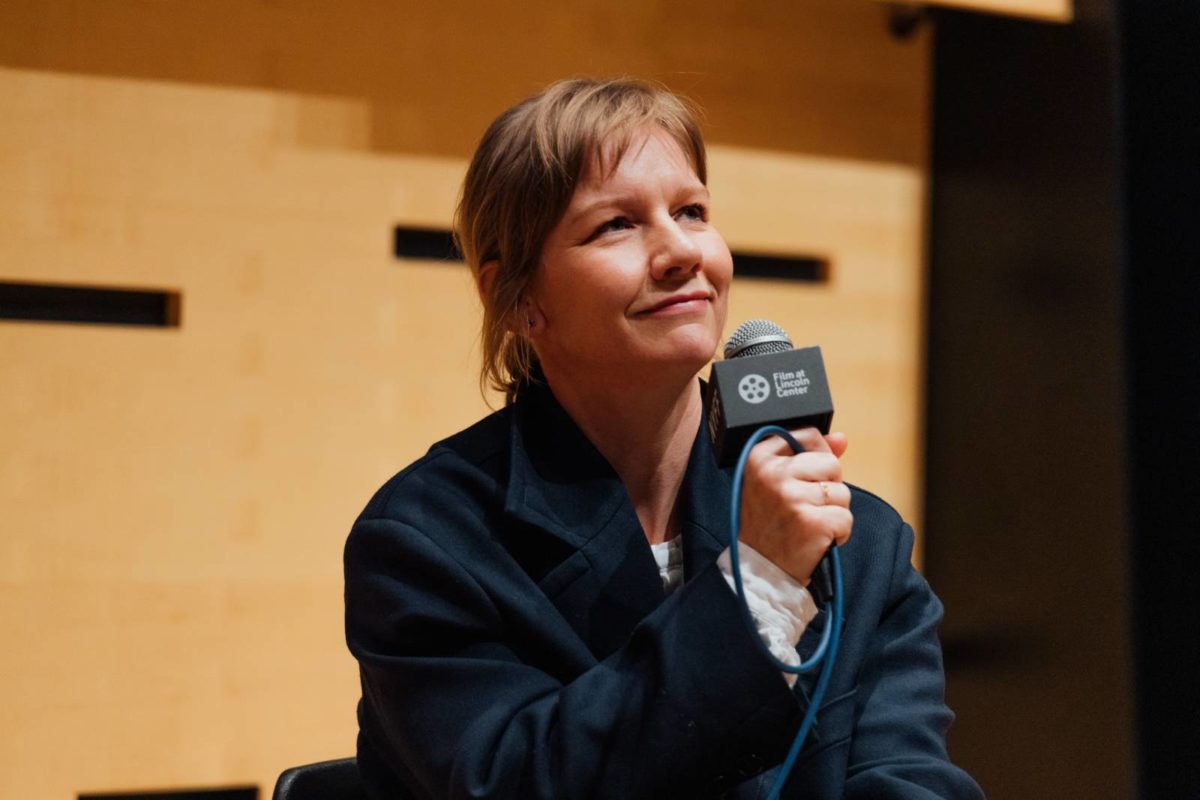
Sandra Hüller at the 61st New York Film Festival. Photo by Sean DiSerio.
Was the magic apparent for you immediately when you got on stage? Or did it take a while, how you felt?
It always felt like a sort of a laboratory and exploration field to find out how humanity works, how people work. How do they speak, how do they walk? We had a long way to go through Berlin to get to that school, a 45-minute ride on the S-Bahn, the public transport.
One of our first tasks, we had to watch people and play them after and talk about them and describe them. I could have done that for the whole four years of the education. I’m sorry, I forget the question!
The magic.
Ah, yes––the magic!
You describe yourself as someone who likes to observe.
Yeah, that’s where this comes from. I think that’s also why I never know anything about any technical stuff in films. I can’t look at a monitor or it distracts me. It’s more about, “What would they do?”
It’s more of an inside work. They didn’t teach us that in school. It was a very technical education: how to use your voice, how to be on stage. What does it mean when somebody is in front or somebody’s in the back. It was a lot about status and how to learn your lines and how to be concentrated, how to use your body in a way that we created all these things. It was more about protection and finding out about your capability of acting.
But the magic, I don’t know––it happens rarely. I feel it’s not something that always happens. In the beginning, when I started, I was very tense and didn’t want to make any mistakes.
And I think that changed after 15, 17 years of acting when I met a director, Johan Simons, in Munich––a Dutch director who was very famous in Germany as well––and there was a new sort of education. It started there for me because he was always talking about how everything is allowed on the stage. Not in a violent way, but every thought will be allowed.
So whenever I would think about my partner, I’m about the smell that I have under my arms or the way I’m standing, if I’m standing right. All these things would be belonging to the character. This changed everything because there was no tension needed anymore because it was absolutely okay to be there and to make mistakes. And that sort of opened a new door for me because I thought I wasn’t supposed to. It should be a bulletproof performance, you know?
Yeah, this is all very relevant for when we talk about Anatomy and Zone of Interest. And you’re still doing theater today, right? You’re sort of doing it all. And I wish we had more time to talk about your theater career and your music career, which is probably not as well-known, but you do have a beautiful singing voice and I recommend people seek that out.
I’m glad you feel that way. I love singing. I always did it, and sometimes there’s a possibility to do something with it and sometimes there’s not. I try not to force it.
And so how did you get into cinema? Did someone approach you? Did you have an agent?
Yeah. That was kind of magic, in a way, because it’s something that also I didn’t do anything for, right?
There was some success going on in the theater. I won some prizes very early on, and I then started to play in Switzerland, and then agencies approached me. They wanted me to be part of their group. But everybody wanted to have some material. And I said, “I’m only doing theater. I don’t have any material. So what can I do?” And they said, “Yeah, but you have to do it and you have to have it.” And I didn’t know what to do. So I said, “Okay, then we’re probably not going to work together.” And then my current agent came to me from Berlin and she said, “We’re going to do it together, so you don’t need to worry.”
So we did. A few months after I became part of the agency. Hans-Christian Schmid approached her for Requiem, my first film role, and I went to casting and did the whole process. And then we did this film together and we went to Berlinale. So everything came really quick.
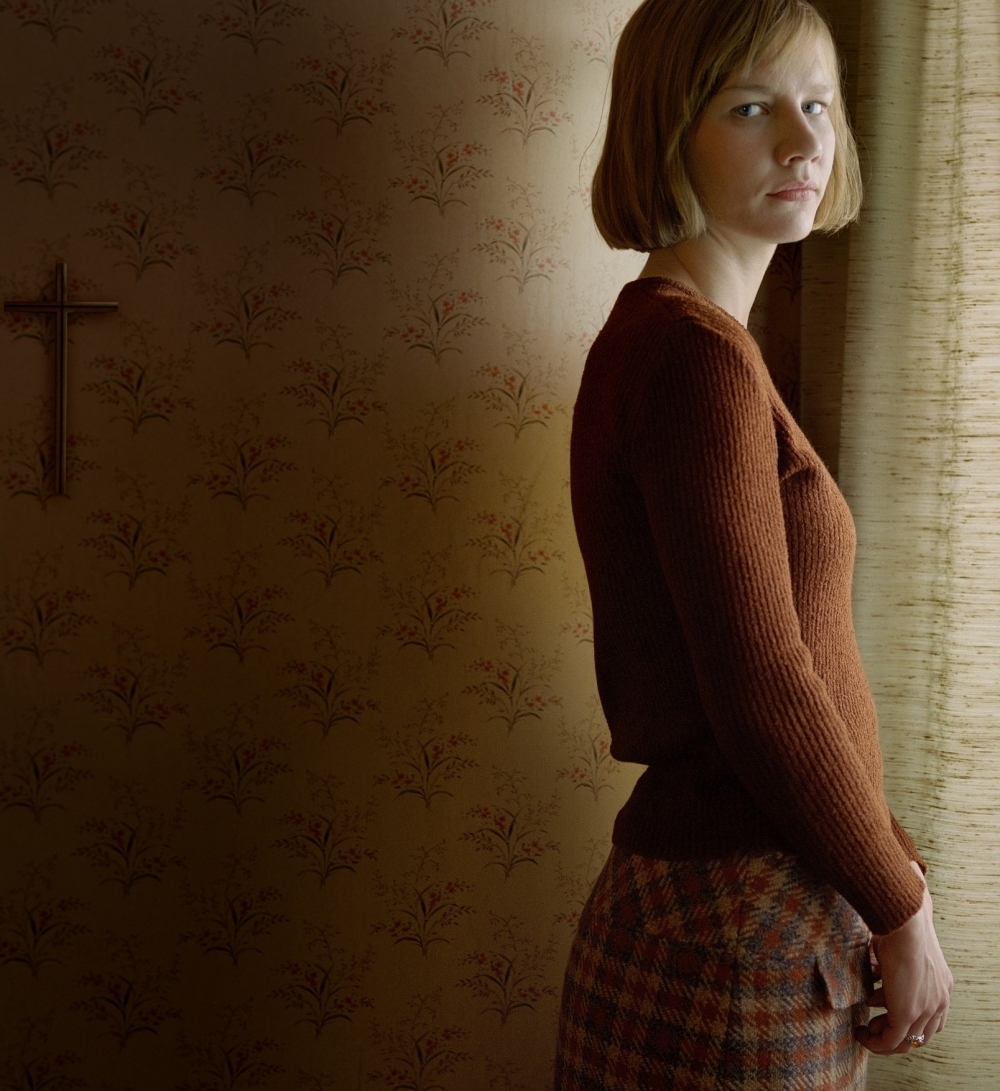
Requiem (2006)
Your first film role, you won the German Film Prize, which is the biggest award in the country. So that was quite an incredible start! Did you feel pressure after that?
Yes, I did. For certain. It was at a point in my life where I had worked a lot and I was, to be open, very exhausted and I really didn’t know how to handle it at that point. It was very early and I felt very much alone in that process because all of the conversation was, of course, about the film, but it was very much about me, and I like to see the work as a collaborative process. So it really shocked me that it would be possible to just have me in interviews or in, you know, this sort of conversation.
So I really didn’t know how to handle it. I wasn’t prepared for it at all. And it was not only that; it was also Berlinale. So there were a lot of things going on. And then I just went back to the theater straight, because I felt safe and I knew what I was doing there. And I didn’t have to do any interviews there, and slowly I did more and more little film works. But I always came back to that place.
In looking through your filmography, what struck me also, if I may say, was the amount of women directors you work with. I’ll just read out some of them; I’m sure many of them are known to the audience here. Here you have Maria Speth, Nicolette Krebitz, Frauke Finsterwalder, Jessica Hausner, Maren Ade, Alice Winocour, Maria Schrader, Annika Pinske, Justine Triet of course. Wonderful, wonderful directors. Is that a conscious choice?
No, they just wrote great scripts.

Brownian Movement (2010)
I wonder if there are any titles in your filmography that didn’t travel as much as some of these works, which you might want to highlight to a North American audience that they could seek out. Are there any special ones, any personal ones for you?
The first time I worked in another language, in English, was Brownian Movement by Nanouk Leopold. I really loved working with her because she has a very special pace and working with her is really, really calm. And it was the first experience with a non-German set, which means I experienced the pleasures of working with people who don’t speak German, because there are so many things going on that you always connect to yourself. If there’s a problem with the light oh, [you think] “We should be careful.” Oh, somebody is in a bad mood today. You don’t do that when you don’t understand what they’re saying. I found something about that really relieving and I thought, “Maybe it’s a good idea to do that more often.” That’s not about Nanouk Leopold. To me, she’s a true genius. She’s also a dear friend of mine and I would love her to write another script that we could do together.
She also directed one of your music videos, “The One,” which is really beautiful and makes fabulous use of your physicality. I mean, maybe we can even talk about that a bit, because I was wondering if that choreography came from yourself or from Nanouk.
It’s an improvisation that she did for another work called “Another Woman” that we did with Meg Stuart, who plays the… well, one of us is the other woman, I don’t know. We’re two women in this film and we never met. We met in our personal lives but not in our professional lives, unfortunately––I’d love to work with her––but yeah, she wanted to tell a story about a couple separating. So she had some spare material and she gave it to that video. The scenes that are in there are just improvised with a chair. She just told me, “Move on the chair.” So I try to find the most awkward position.
Your filmography really covers a whole gamut of styles and genres. You have comedy and drama and also quite a bit of historical drama in there, and then you’ve played real life people such as Sisi, Ulrike Meinhof, Clärenore Stinnes––who was a German race car driver and one of the first people to circumnavigate the globe by car––and Hedwig Höss. I want to ask you about research when you’re playing these real-life figures. Are you someone who goes deep, or do you prefer to really stick to the script?
It really depends. And I don’t know, I don’t want to be impolite but: I didn’t play Sisi. I played the woman who also lives there and helps them, Irma Sztáray. It depends. For example: with Michaela Klinger in Requiem, I really wanted to know a lot of things about her. I refused to see the things that you can find on YouTube, like the real sound recordings of the exorcisms taking place. I found that was crossing the line. I wanted to leave that to her, but I had to find out a lot of facts about epilepsy and people who think they are possessed. Or maybe they are; we’ll never know. So there was a lot of research. Hans-Christian Schmid gave me a book with all the material that he had.
For Irma Sztáray, it wasn’t like that because Frauke Finsterwalder didn’t want us to have any material about the life of these characters, because she wanted to invent them. She didn’t feel any sort of responsibility towards them, which I thought was right. There was a short film from Nicolette Krebitz which also wasn’t much preparation. But Requiem I feel was a special thing because people still talk about what happened to her. I had the strong feeling that I would have to protect her and the narrative about her. So I tried to have as many facts as possible.
And then in 2016 came Toni Erdmann, which was quite the sensation at Cannes, as it was here. And you were here with it, as well as the late, great Peter Simonischek and Maren Ade. Internationally, it did so well. It put you on the international map. What was it like for you, working in Germany after that? Did it change much for you?
Yes and no. I mean, my way of working was the same. I really can’t say what it is, exactly, but I feel it’s the right way to do it, so I didn’t think about that too much. Of course there were more books, more scripts that landed on my table, and I could choose way more than before. But also I was kind of confused. I really didn’t know how to go on because people were acting like this is the peak of what is possible for you.
I tried a lot of things. I made a proper comedy and a small film at the same time. And I really tried to find my focus again, because up to that point I felt like everything was really clear to me. And after that, I kind of lost the sense. Maybe it’s also a question of age, I’m not sure, but I had to find out where I wanted to go. It took a while.
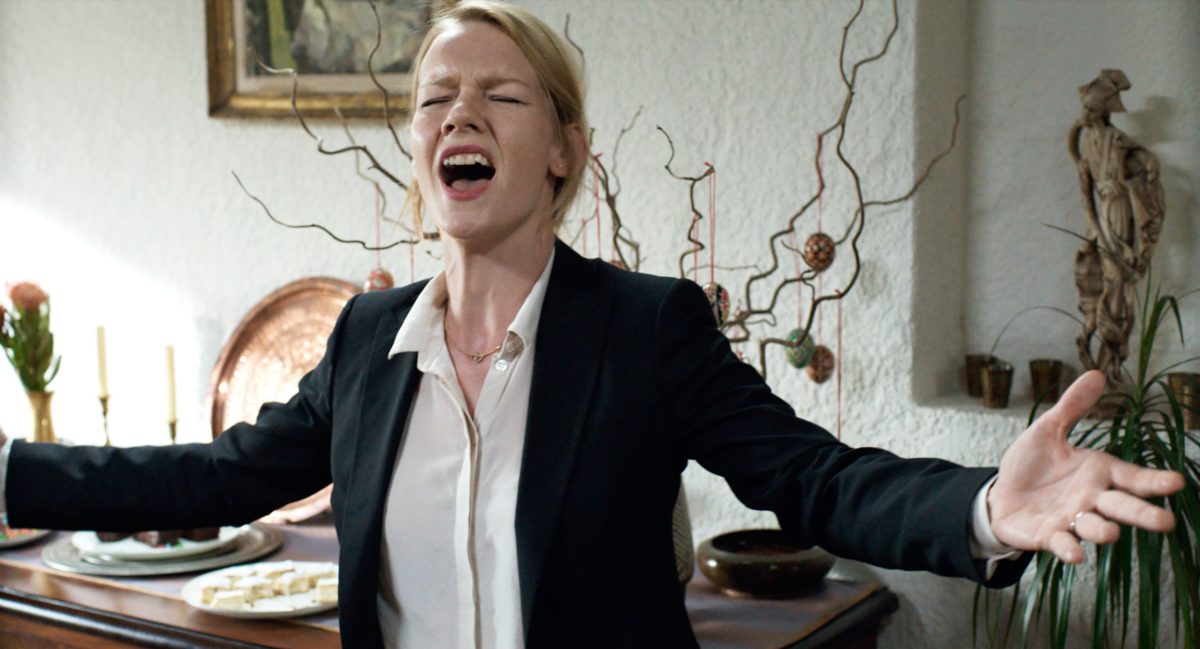
Toni Erdmann (2016)
Because it was such a whirlwind?
Exactly, because it was such a whirlwind. And because people have expectations when I come to set. Everything would be like, “Yeah, now she will do it!”
Which is… it never happens that way. And I hope that I will never get in a position where I myself feel that this would be the way to do it, to go there and know how this would work. Because I never know. Normally I really like to let some time pass between works because I always have to, first of all, get back into my own life, to my family, into my body, to regulate all the funny hormones that come when you work and when you are successful. To balance all these things. I step back a bit.
So in 2023, the year of Sandra, you had your two films Anatomy of a Fall and The Zone of Interest. Watching them together recently again, I was struck and surprised at how they complement each other, dialectically in some ways. Anatomy of a Fall, as its title suggests, is really penetrating and analyzing the situation over two-and-a-half hours and using language and so many different modes of inquiry, but mainly through the spoken word. And yet at the end, it still sort of remains a mystery. And on the other side, you have Zone of Interest, which is showing something very precisely, very clearly through language, but also through just the visual, without overanalysis. Which one did you shoot first?
Zone was first.
You mentioned that when you heard what it was going to be about, and this character of Hedwig Höss, you were very reticent, to put it mildly. And I wanted to ask how you came around to the project. What did you make of the script? Were you given a script? How did you come into this? Because I know it wasn’t a quick decision.
No, it wasn’t a quick decision. And also, when we shoot in Germany, I’m used to getting the whole script from the beginning and to decide according to the script if I want to do it or not. Meeting the director or going to a casting is all very transparent.
And that didn’t happen here. We had kind of an experience with that, because whenever people come from the U.S. or England or sometimes even France, they don’t show you the whole script, just two pages of something. So that happened. And also I didn’t know who we were talking about. I didn’t know that Jonathan Glazer would be the director. So it was kind of a mystery thing going on. And it’s the first thing where I thought, “Okay, it’s not something that I’m used to, because I want to be a partner from the beginning.” That’s very, very important to me. So there were just two pages of a couple fighting and I didn’t know who they were.
I was invited to the casting, and I went there and then they told me what it was about, about these people and about where they lived, next to Auschwitz, and what they did to humanity. And, also, I found out about Jonathan Glazer. So two things that I really couldn’t combine in my head and in my heart.
It was a long process to decide, because Hedwig Höss is not someone who interests me very much, I have to admit, and whom I don’t like. I never wanted to be part of such a narrative. I never felt the urge to portray a fascist. It feels really weird to me, so there were a lot of conversations about doubts that he also had. We didn’t portray these people, we strongly feel. We portrayed the life that they were living, and we kind of connected it more to us than to the past and to the time that they were living in. It was more about a film about the phenomenon of how to blend out all the reality around you, in the moment of responsibility you have as a human being. And that is something that spoke to me. If it would have been some sort of biopic or a normal dramatic story about this couple that has problems, I would have refused; that’s not something that would have interested me. But Jonathan Glazer, and also Jim Wilson, they’re such tender people and so intelligent and obviously so talented that I felt like it would be the right thing to do.
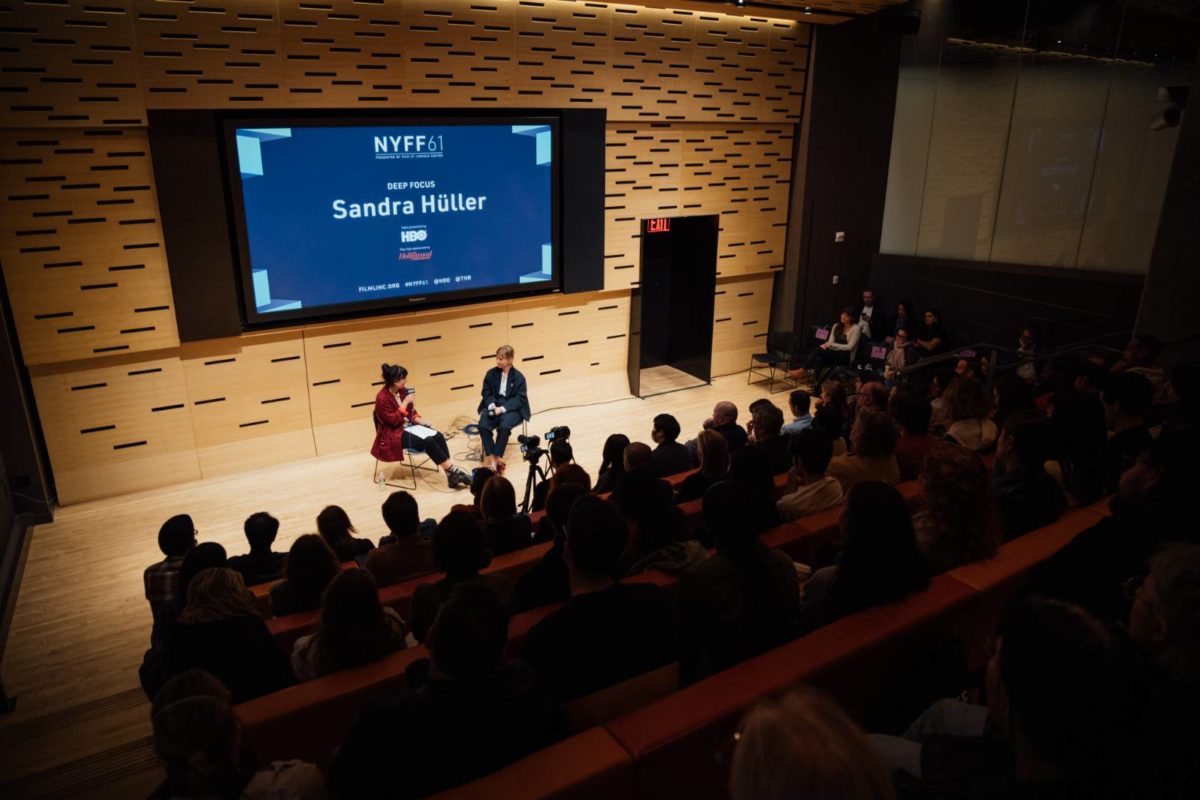
61st New York Film Festival talk. Photo by Sean DiSerio.
It’s quite fascinating how it was shot. My understanding is several cameras placed around this house where most of the action takes place were hidden––they were sort of embedded in the production design. So you were effectively acting, performing with your fellow actors almost as in theater, would you say? What was that like for you, to not have the cameras present in your face?
I tried to make this comparison, too, but in theater you also have a direction that you play to. We didn’t even have that. We didn’t sometimes. Sometimes we didn’t know where the cameras were, exactly. In those rooms or around the house, some of them we saw, but we never knew what they were filming; if they were close or away, what kind of lens they would use. So he basically left us alone with those characters and with the story, and with all the things that were going on in the house and around the house and behind the wall. So it was a mixture between an indescribable amount of freedom that you have as an actor because you don’t need to think about light and marks. There’s nobody running around like you normally have. And I love the teams––I love to have the teams around––but there was really nobody. Focus pullers were in the basement. Jonathan would come over after we finished a 10-minute scene. They always used all the material, then they had to come and talk to us.
And then we did it again. It left a lot of space for your own thoughts, for the connection between us. It gave us the sense of a constant focus. When you film in a regular way, that changes because the partner is not always on-camera anymore. So they do something else or relax a little bit. We didn’t have that. So everybody was in the same focus and tension all the time. And that was, to me, the most beautiful thing: to have the feeling that everybody was in the same boat. At the same time, there was a huge responsibility coming with it. Because of course it was directed, but at the same time we were alone.
So we had to decide what side of the people we wanted to show and what we didn’t want to show. If the silence would be bearable or not. If we started to move or not, we would sit it out. So it was all our decision.
So it’s more collaborative with your fellow actors than perhaps the traditional set?
Yes, definitely. And I still feel very close to Christian because of that experience.
You’re a very physical actor. And what did it feel like in your body, not knowing where you should direct your energy or your gaze? I mean, did you just focus on the interaction between the different characters?
Yes, of course. I do have some scenes where Hedwig is alone or with the flowers or the dog and there is a feeling of loneliness, which is not something that I would pity at that moment. It was something that I would gladly do to her––you know, to feel alone in that space. And she would probably come up with something to do, not to feel that. As Jonathan says, “In order to start to think, you need to pause,” and she would be somebody who would never pause.
She would always find something to do. I like the direction that was missing––not the direction from a director, but the direction of playing where it would go. I like that very much, because in the end you stayed with yourself all the time. You could feel all the things that you were doing and why, and it would never be for a camera, or for whoever––foreign audiences. Most of it would be for the partner, which is the most important to me.
And can I ask about the hair? I was fascinated by it. Was it as painful as it looked? You had that same hair, the entire film.
Yes. That was an invention of Waldemar Pokromski, our genius makeup and hair artist. It wasn’t painful at all. And it’s not only my own hair––it’s additional hair, too. But it very much helped me to play Hedwig because it was something that I would never do. It wouldn’t be something that I would have come up with, with my own hair.
There was a picture of her with the family and they took it from. So it’s an actual hairdo that she had. And it is weird.
Her gait, the way she carries her body is also really fascinating as well. Did that come from somewhere in particular? Was that just how the character was conceived?
So when we started working on it, I was especially interested in the garden because I had people in my family growing up who loved gardening who were older. I always watched them and also noticed they have a certain way of not connecting to other people like Hedwig does, a sort of emptiness that is in them.
So I had that in my mind and I had it in my memory for a long time. I proposed that to Jonathan. Almost the first day we talked about this, how somebody would pick up dirt. Some people do it very elegantly. They kneel down, like some of us do––or maybe I would do––but there are some people that just bend down and take it because they are farmers. And, you know, there was something rude in it, not touching the flower and not feeling the beauty of it. Just taking it out, not in a practical way, but in a rude way. We felt very strongly that with all the beauty around them, that we as audience can definitely see and feel, these people would see a rose and it would not do anything to them in their souls or in their hearts.
They just can’t, or we didn’t want to give it to them. And it was our decision to not give it to them. That was kind of the thing that we thought about. I also thought about the children that she had. It was a very physical attempt to play her and to get more into her body and into her mind, because I really didn’t want to. I didn’t see any sense in it. I didn’t find any joy in that thought.
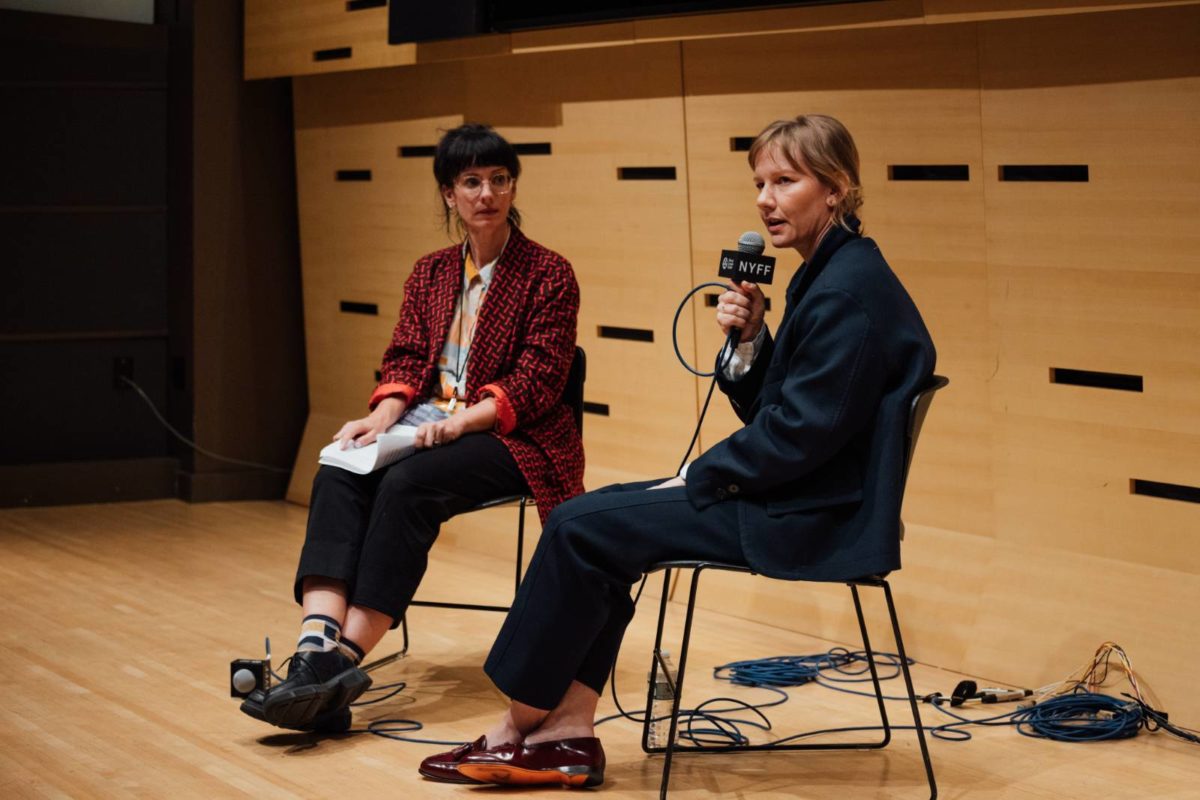
Michelle Carey and Sandra Hüller at the 61st New York Film Festival. Photo by Sean DiSerio.
And with Anatomy of a Fall, you have another fascinating character. I mean, there’s so much to feel in this performance. I was so fascinated by her because it’s about ambiguity in some ways, or holding several truths at once. You mentioned truth when you were a child watching TV. How were you able to deal with that as a performer, not really knowing what the truth was of this situation?
Two days before we started shooting, I really wanted to know if Justine could please tell me the truth about this, because before, I didn’t ask myself. I was just defending the woman who was attacked. I strongly felt that’s what this film was about. It is a very feminist film on so many levels, and I’m glad to have been a part of it.
But then I think it was more of a personal thing between her and me because, sometimes, before shooting we start to panic a little, if it will all work out and if the thoughts we have are right. And I just wanted to make sure that she’s not playing a game with me, like letting me prepare something and in the end she would laugh and tell me about how it happened. So it was more of a personal question between us. I wanted her to reassure me that we were on the right path. And she just said, “You have to play her like an innocent,” which was much worse than I expected because I wouldn’t have an answer at all.
But I never asked her and I never asked myself again because I felt this ambiguity that you’re talking about––something that I have to deal with myself every day, and my family and my friends. I never know what anybody really thinks. I can only decide to trust them. So that’s what I did with her: I decided to trust her that what she’s saying is true. And I try to play her in a way that I would believe what she’s saying. Everybody would believe what she was saying because she really means it. And especially in the trial in the courtroom, we had a real audience, there were people there every day listening to us. And having their opinions. So of course I tried not to convince them, but I was really trying to tell the truth.
Watching the film, one’s natural thought is: “Is she guilty? Is she not?” And I was thinking about you and also back to Toni Erdmann, that fantastic karaoke scene. And I think what you do so fabulously, that not a lot of even really great actors can do: you can hold more than one emotion in your face at once.
I think I’m hearing about this for the first time, so thank you. I think we have several thoughts at the same time. In theater school they said you can only have one thought at the same time. You can think, or walk, and you always have to decide. And the longer I worked, I felt like that wasn’t really true because you know it from yourself. I mean, there are situations in life––like a hundred things––and you cannot even say what it is, but it’s there. So I think the stronger the thought is, the stronger the intellectual work that I do, the more feelings can take place, or the more possibilities I have to show it. It’s like, maybe it’s a physical thing because there are so many muscles or something. I have no idea. But it can change very quickly, I think. And I don’t know where that comes from.
So much at play in the film is around language. It’s a French production. Most French productions are usually completely in French––it’s a very self-sustaining, huge industry with its own heritage and history. Your character prefers to speak English, though when she does speak French, it’s very good. And I heard you just learned French for this role.
I started a little bit before because I had some time off and I was thinking about what I want to do and I always wanted to learn French in school. So I started to learn, and soon after the French people came. I had to put a lot of work into this sort of French. It was a preparation of three or four months.
But it was something very palpable. There’s this character’s feeling of being so alone. And particularly in a country like France, which is so focused on its own language in this region of France as well. And I was wondering if that was sort of echoed on set as being an English-speaker in an all-French crew and cast.
No, fortunately not at all. It was a mix all the time. Some people even tried to speak German to me, which was always very moving. Everybody spoke French and English, mixed all the time. Even Milo––who only speaks French in the film––he’s a very good English-speaker, and of course Jehnny Beth, who has lived in London for a long time. No, there wasn’t a problem at all. Not at all. Because it was the topic of the film and because it is a technique to push people away and to humiliate, to always talk about their problems with language.
Those scenes with Milo Machado Graner really hit me in the gut because there’s many things happening in this film, but as we go along what ultimately surfaces is the exposure of so many aspects of their relationship. That can be a gut punch for a mother––to hear from their son they may have doubts. What was it like filming those scenes with him?
Milos was always very protected on set. There were a lot of people taking care of him, so it wasn’t me who had to do that. I know it’s a bit different on German sets because sometimes you have to do it yourself as an actor, taking care of the child you’re playing with.
The relationship we had was a very professional one. He really behaved like a partner. I always had the feeling that he was so safe with his acting. He always knew where the feelings would come from and totally was able to let them go when the scene was finished and just be the boy again having fun in the snow. I didn’t have the feeling that I would have to put too much in order to get some emotion from him, because that is sometimes what happens. He did all the work himself with Cynthia Allen, who coached him, and with Justine. I could just play with him because I think of Sandra as a very respectful mother. She respects the boundaries of other people very much and also the boundaries of her son, only 11 in the film. I found that astonishing, that she would never go there and try to get something from him to make her feel more seen or seen or loved, forgiven or, you know, all these things that people tend to do sometimes, except when she’s a bit drunk and talking.
Anatomy of a Fall is now in theaters and The Zone of Interest opens on December 15.
